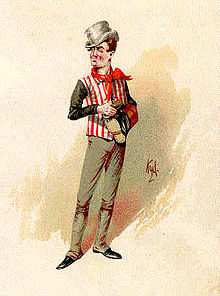
Back ওয়েলারিজম Bengali/Bangla Wellerismus German Wellerismo Spanish ولریسم Persian Wellerismi Finnish Wellerisme French Wellerismo Italian Wellerismus NDS Apologisch spreekwoord NDS-NL Apologisch spreekwoord Dutch
This article possibly contains original research. (December 2023) |
Wellerisms, named after sayings of Sam Weller in Charles Dickens's novel The Pickwick Papers, make fun of established clichés and proverbs by showing that they are wrong in certain situations, often when taken literally.[1] In this sense, Wellerisms that include proverbs are a type of anti-proverb. Typically a Wellerism consists of three parts: a proverb or saying, a speaker, and an often humorously literal explanation.

Sam Weller's propensity to use the types of constructions now called "Wellerisms" has inspired plays; sometimes, the playwrights have created even more Wellerisms.[2]
A type of Wellerism called a Tom Swifty incorporates a speaker attribution that puns on the quoted statement.[1]
- ^ a b Lundin, Leigh (2011-11-20). "Wellerness". Wellerisms and Tom Swifties. Orlando: SleuthSayers.
- ^ George Bryan and Wolfgang Mieder. 1994. "As Sam Weller said, when finding himself on the stage": Wellerisms in dramatization of Charles Dickens' Pickwick Papers. Proverbium 11:57–76. Also Online version